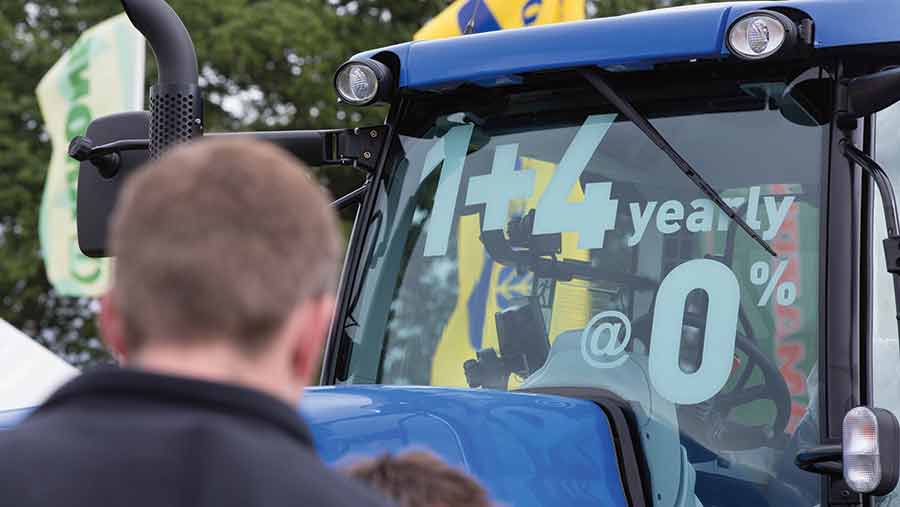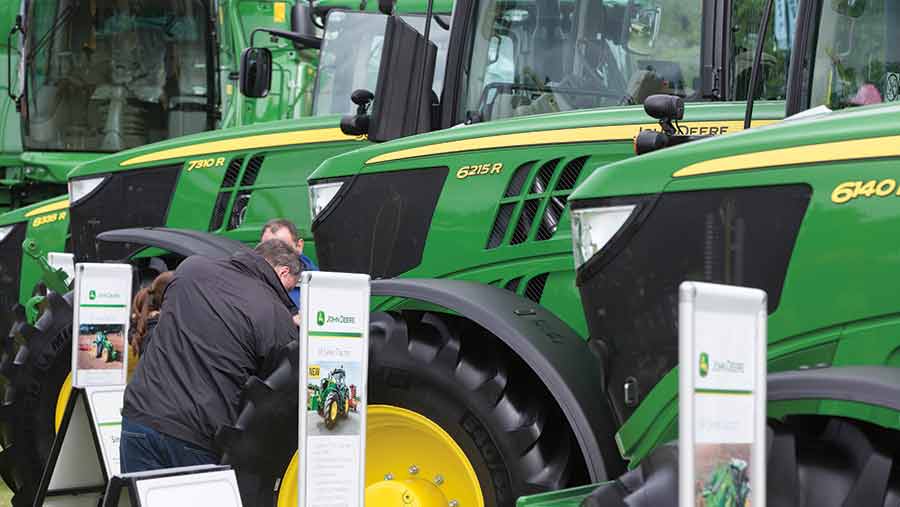Tips for contractors to balance cashflow and big kit purchases
Dorset-based contractor and NAAC treasurer Jim Farquharson has learned over the years that successfully running his farm contracting and mobile feed business relies on providing a well-costed service, rather than having the biggest or shiniest machinery.
“It can be difficult for a contractor, if bombarded by customer requests for additional services, not to get pushed into buying a never-ending raft of new, improved or bigger machines,” he says.

© Tim Scrivener
“Interest rates hitting an all-time low has increased the appeal, but it is important to bear in mind the dark winter days when a lot of machinery can be parked up, earning nothing for months,” says Mr Farquharson.
See also: Kent farmer rates his retro-fit Redekop combine chopper
“I have to put on my professional head when looking at new kit and take a long, hard look at what a machine will earn for my business. Accurate costings are vital to make sure I can run the machine at a profit and that I have sufficient work to maintain an ongoing return.”

Jim Farquharson
“Added to that, the Brexit vote has plunged us all into an unpredictable environment and in uncertain times, it is important to be confident of your forward plan. Only then should you start planning financial loans,” says Mr Farquharson.
Machinery costings
Accurate machinery costings are probably the most important factor in any contractor’s business. It guarantees that work is being charged at a sensible rate to ensure finance can be repaid along with other business outgoings.
The NAAC produces annual charges that are intended to be used as a national gauge for both contractors and their customers, but nothing can replace individual calculations for each machine run, taking into account staff, overheads, repairs and finance.
Sitting down with a calculator and a large cup of coffee is one option, but there are now online tools such as Kitmaster available to help businesses work out what they should be charging.
Though it is not a fail-safe solution, it should help contractors keep their heads above water, repay debts and ensure they can continue to run a reputable business.
Basic budgeting
Finance expert Mark Suthern, head of agriculture at Barclays, emphasises that simple budgeting will show whether you can afford a piece of machinery.

Mark Suthern
“If the business can’t fund the purchase through usual trading, then remember you don’t have to own everything you need to offer the service – hiring specialist kit might be the answer.
“There is definitely a place for kit hire if you are only likely to use the machine for a short period or for a specific contract,” says Mr Suthern.
“For example, if you spread farmyard manure seasonally or only have a small customer base of people with combinable crops, then hiring kit will probably be more cost-effective than having a machine sat in the yard depreciating for 10 months of the year.
“Hiring will also have the benefit of reducing your maintenance and storage costs,” he says.
“However, each business is different and if you are confident that the kit will be in daily or weekly use, such as a slurry tanker or tractor, then you should consider owning the machine to make sure you have access to it as and when you need it.”
Financing machinery
When it comes to finance, there various options available through banks and finance companies, often linked directly to machinery manufacturers and dealers.
For smaller items, an outright cash purchase might be the cheapest option and could give you greater buying power and a better deal.
However, the purchase must not affect the working capital requirements of the business.
For larger pieces of kit, Mr Suthern suggests there are many methods of funding, including hire purchase and asset finance or through equity release.

© Tim Scrivener
Again, he highlights the importance of remembering that the business must be able to fund the machinery within its useful working lifetime, otherwise it won’t pay for itself in the long term.
“If the business needs to replace the machine while it is still paying for the old one, it puts huge pressure on cashflow – the cost of delivering a service – and will eventually affect a business’ competitive position and pricing in the local market,” says Mr Suthern.
Farmers Weekly buyers guides
If you’re in the market for a new combine then head online to our combine buyers guide. It covers the specs and prices of all the machines currently on the market and is a good starting point for any buying decision.
Just as importantly, he emphasises the importance of machinery not being funded by an overdraft.
“There is a real chance that the capital cost will sit within the overdraft indefinitely, which effectively makes it a never-ending, interest-only loan. Therefore the machine never really gets paid for by the trading of the business.”
Avoid overstretching yourself
It is always difficult to know when to stop purchasing before you get into difficulty, but careful planning will help. Barclays is keen to advise customers against getting overstretched.
“The key is to only buy kit that is used regularly. For those machines that are only given a run-out for a few weeks of the year, such as combines, drills and forage harvesters, perhaps do a detailed partial budget to see if hiring might work out cheaper in the long run, or if it’s even worth offering that service at all,” says Mr Suthern.
He also suggests thinking about specialising in a few areas rather than trying to be all things to all customers.
“This might cut the need to purchase every type of machine available,” says Mr Surthern. “And if you can dovetail the operations seasonally, it can give great continuity of business management, cashflow and labour requirement.”
Cashflow danger signs
So, how do you recognise that you may have gone too far?
“The usual signs of getting into dangerous cashflow positions are overdrafts that are not fully fluctuating, missed payments on machinery and creditor days slipping.
“It is vital to open lines of communication immediately, as there are usually several options, such as capital repayment holidays or rescheduling of some debt payments. Talk to the bank and also creditors and finance companies as soon as cash becomes tight,” says Mr Suthern.
Remember, as a contractor you are aiming to offer a reliable, effective service to your customers. So, as much as shiny new kit may initially impress, your reputation will only be retained if your costings are carefully calculated, your finances in order and you turn up on time with well-maintained machines that do a good job.

